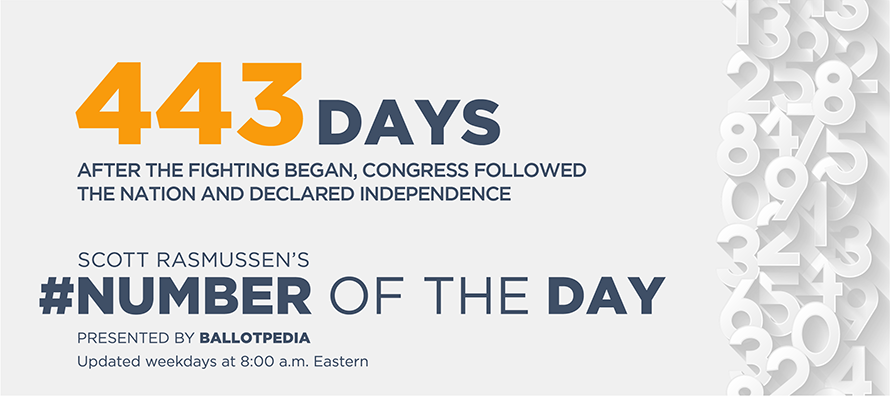Scott Rasmussen's Number of the Day for July 4, 2017

The Number of the Day columns published on Ballotpedia reflect the views of the author.
July 4, 2017:
The following is an excerpt from Scott Rasmussen's latest book, Politics Has Failed: America Will Not.
The Declaration of Independence deserves its place as one of the most important documents in the history of the world. But, despite its significance, the Declaration did not lead the nation to independence or inspire people to take up arms and begin a revolution. Instead, the Continental Congress acted 443 days after the War of Independence began.
Historian Kevin Phillips points out that Colonial authorities “began to exercise power twelve to eighteen months before” the Declaration was approved and they had already achieved a “de facto independence.” In fact, by the end of 1775, most of the Royal Governors had been forced to flee the colonies. By then, “a few square miles of Boston represented the sole remaining seat of British occupation, authority, and might.”[1]
Long before colonial politicians declared the nation’s independence, men like Levi Preston had already made it a reality. On April 19, 1775, an 18-year-old Preston joined hundreds of his neighbors standing up to the British in what became known as the Battle of Lexington and Concord. Seven decades later, historian Mellen Chamberlain tracked down Preston to find out what led him to fight on that day.
The historian assumed it might have been the Stamp Act or Tea Tax, but Preston said he never saw a stamp or drank any tea. “The boys threw it all overboard.” Trying a different approach, Chamberlain asked about the writing of “Harrington, Sydney, and Locke about the eternal principles of Liberty.” Preston must have thought the young man daft: “I never heard of those men.” He added, “The only books we had were the Bible, the catechism, Watt’s Psalms and Hymns, and the almanac.”
At this point in the discussion, the young historian must have been a bit frustrated. So, he again asked why did a teen-aged Levi Preston choose to fight? “Young man,” Preston replied, “what we meant in going for those Redcoats was this: we always had been free and we meant to be free always! They didn’t mean that we should.”[2]
This passion for freedom “acquired strength in the United States from the fact that it did not develop simply within a single sphere of life. Rather, it permeated every aspect of the behavior of the whole society.” Respected historians Oscar and Mary Handlin noted that “American freedom possessed a political aspect.” It “was also social in character… and gave people of every sort a conviction that they had an important stake in the freedom of the communities.” And, critically important, “the evolution of voluntary religious, economic, cultural, and philanthropic organizations offered alternatives to state action.”[3]
It was this attitude, deeply embedded in the colonial culture, that inspired the revolution. The politicians followed. “Jefferson’s contribution was to state compellingly ideas and beliefs that had already worked their way into American political culture.”[4] He put into words what the American people already believed.[5] The Continental Congress merely confirmed what had already taken place.
That’s the way it always works in America. The culture leads and the politicians lag behind. And, more than two centuries after independence was declared, American culture remains deeply committed to the founding ideals of freedom, self-governance, and equality.
Each weekday, Scott Rasmussen’s Number of the Day explores interesting and newsworthy topics at the intersection of culture, politics, and technology.
- July 3, 2017 – 97 percent of congressmen running for re-election in 2016 were re-elected
- June 30, 2017 – 178 elected officials targeted for recall this year
- June 29, 2017 – 10 years ago today, the first iPhone was released—the most revolutionary product ever
- June 28, 2017 – 59 percent of liberals would participate in civil protest—up from 41 percent before Trump was elected
- June 26, 2017 – 72 percent of Americans have fired a gun
- To see other recent numbers, check out the archive.
Scott Rasmussen’s Number of the Day is published by Ballotpedia weekdays at 8:00 a.m. Eastern. Click here to check out the latest update.
The Number of the Day is broadcast on local stations across the country. An archive of these broadcasts can be found here.
Columns published on Ballotpedia reflect the views of the author.
Ballotpedia is the nonprofit, nonpartisan Encyclopedia of American Politics.
See also
Footnotes
- ↑ Phillips, K. (2013). 1775: A Good Year for Revolution. New York, NY: Penguin Group. (pages 17-18)
- ↑ Hackett Fischer, D. (2004). Liberty and Freedom: A Visual History of America’s Founding Ideas. New York: Oxford University Press. (pages 1-2)
- ↑ Handlin, O. & Handlin, M. (1966). Dimensions of Liberty. New York: Macmillan Pub Co. (page 5)
- ↑ Landy, M. & Milkis, S. (2014). American Government: Enduring Principles, Critical Choices, 3rd Edition. New York: Cambridge University Press. (page 41)
- ↑ Buckley Dyer, J. (2012). The American Soul: The Contested Legacy of the Declaration of Independence. Lanham, Maryland: Rowman and Littlefield. (page 19)
| |||||||||||||||||||||||

